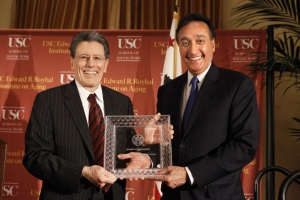Former HUD Secretary Gives 2012 Roybal Memorial Lecture
February 29, 2012 / by Vincent LimHenry Cisneros, executive chairman of CityView and former Secretary of the U.S. Department of Housing and Urban Development (HUD), said America needs to build and modify homes and communities to support its growing older adult population during the 2012 Edward R. Roybal Memorial Lecture.
Sponsored by the USC Edward R. Roybal Institute on Aging at the USC School of Social Work and co-hosted by Rep. Lucille Roybal-Allard, the annual event honors the institute’s namesake and original founder, Edward Roybal—a champion of health and aging services for vulnerable populations.
“He addressed issues of the underserved, and one of those populations for which he had great sensitivity was persons of advancing aging, and as always, he was ahead of his time,” said Cisneros, speaking to an audience that included all of Congressman Roybal’s children.
Speaking from his experience as HUD secretary and head of an institutional investment firm dedicated to creating affordable housing opportunities, Cisneros emphasized the urgency of creating spaces and places where the elderly can maintain their health and independence.
He noted the fastest growing segment of the United States population is aged 80 or older and that the number of those aged 65 or older living in America is expected to dramatically increase in the coming decades.
Research further indicates the vast majority of older adults in the future will not spend the last years of their lives in nursing homes but in residences they own or rent, Cisneros added.
“We haven’t, as a country, confronted the reality that we have a huge portion of our population aging and have made no provisions for the people who are going to have to live independently on their own,” said Cisneros, who serves on the Board of Councilors at the USC Sol Price School of Public Policy.
He said that making homes and communities more senior-friendly and extending the health and longevity of older adults would benefit American society as a whole.
He refuses to view support for the elderly as an obligation conferred purely out of respect or sympathy.
“It’s more than an obligation,” Cisneros said. “It’s a reality that we pay costs if we’re inattentive, and we do not reap the full talents of people who still have a lot to contribute.”
He shared anecdotes from his own life about his aging mother and late father who remained active even as he grew older.
“It is an amazing thing to see people in their eighties who still want to live with a sense of purpose and accomplish things and give back,” Cisneros said. “My father – after a stroke – for 18 years, having been an army colonel, volunteered at an elementary school to teach children to read.”
Those personal stories and Cisneros’ vision for aging in place are part of the forthcoming book Independent for Life: Homes and Neighborhoods for an Aging America that he co-authored and edited.
The event concluded with the presentation of the USC Roybal Institute Community Partnership Award to Laura Trejo and the Pearmain Prize for Excellence in Research on Aging to Ronald Angel.
Trejo, who earned her master’s degrees in gerontology and public administration from USC, is the general manager of the City of Los Angeles Department of Aging. A well-known national leader in the field of aging services and education, she has received numerous honors, including the American Society on Aging 2011 Gloria Cavanaugh Award for Excellence in Training and Education.
Angel, a professor in sociology at The University of Texas at Austin, was one of the driving forces behind the development of the field of Hispanic aging research. He is the author of five books and several refereed journal articles, chapters and reports on minority aging and health disparities.
To reference the work of our faculty online, we ask that you directly quote their work where possible and attribute it to "FACULTY NAME, a professor in the USC Suzanne Dworak-Peck School of Social Work” (LINK: https://dworakpeck.usc.edu)
